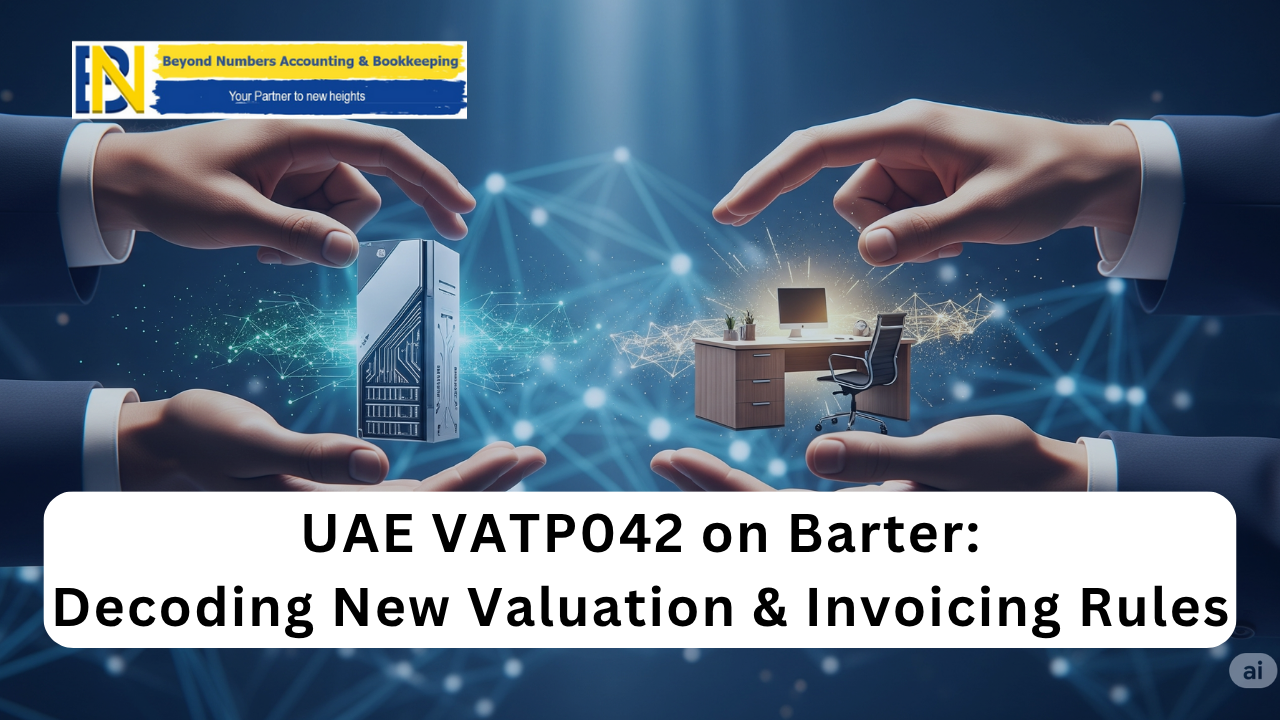The Federal Tax Authority (FTA) in the UAE has consistently sought to provide clarity on complex tax scenarios to ensure robust compliance across the business landscape. A significant recent development in this regard is the issuance of Public Clarification VATP042 – Value of Supply – Barter Transactions. This clarification, released on April 28, 2025, precisely delineates how barter arrangements impact UAE VAT rules, emphasizing that such non-monetary exchanges are unequivocally subject to VAT, requiring meticulous valuation and stringent compliance.
Historically, the concept of “consideration” for VAT purposes extends beyond mere monetary payment. It encompasses anything received or expected to be received in exchange for a supply. Barter transactions, by their very nature, involve such non-monetary consideration, thereby falling squarely within the ambit of UAE VAT legislation. This clarification reinforces the principle that the absence of a cash exchange does not exempt a transaction from VAT obligations.
The Fundamental Principle: Dual Supplies in Barter Arrangements
A core tenet of VATP042 is the reaffirmation that a barter transaction inherently involves at least two distinct supplies. Each party engaging in a barter agreement is deemed to be both a supplier and a recipient of a taxable supply. For instance, if Company A provides IT services to Company B in exchange for office furniture, Company A is supplying IT services and receiving furniture as consideration, while Company B is supplying furniture and receiving IT services as consideration. Both these reciprocal supplies are individually assessed for VAT.
Valuation Rules: Ascertaining the Taxable Base
A primary challenge in barter transactions lies in accurately valuing the non-monetary consideration for VAT purposes. VATP042 provides a structured, tiered approach to determine the taxable value of such supplies, ensuring fairness and consistency:
- Market Value of the Supply: The paramount principle dictates that the value of the supply is the monetary consideration the supply would generally achieve if provided in similar circumstances, on the same date, within the UAE, in an arm’s length transaction between unconnected parties. This reflects the fair market value.
- Market Value of a Similar Supply: If the market value of the exact supply is not readily available, businesses must ascertain the monetary consideration that a similar supply would command under comparable circumstances in the UAE between unconnected parties. This method broadens the search for a comparable benchmark.
- Replacement Cost: As a last resort, if neither of the above methods yields a quantifiable market value, the value of the supply is determined by the replacement cost of identical goods or services acquired from an unrelated supplier. This ensures that a value is always ascribed for VAT purposes, even in highly unique barter scenarios.
Crucially, when a supply involves both monetary and non-monetary consideration (a “mixed consideration” scenario), the value of the supply for VAT purposes is the sum of the monetary consideration received and the market value of the non-monetary consideration, excluding the tax amount.
VAT Treatment: Applying the Standard Rules
Once the value of each supply within the barter transaction is accurately determined, the standard UAE VAT rules apply. This means that a supply within a barter transaction can be:
- Standard-rated (5%): The most common scenario for taxable goods and services.
- Zero-rated (0%): If specific conditions for zero-rating (e.g., certain exports of goods or services, qualifying healthcare or education services) are meticulously met.
- Exempt from VAT: If the supply falls within the categories of exempt supplies (e.g., certain financial services, bare land, or residential real estate).
- Outside the scope of UAE VAT: If the place of supply rules dictate that the transaction occurs outside the UAE.
Each party to the barter must independently assess the VAT treatment applicable to the specific goods or services they are providing.
Invoicing and Compliance Requirements: A Dual Obligation
VATP042 underscores the critical importance of documentation and invoicing in barter arrangements. Where both parties to a barter transaction are VAT-registered and are making taxable supplies to each other, each party is mandated to issue a tax invoice to the other. This requirement applies even in the complete absence of monetary consideration.
Each tax invoice must contain the standard particulars required by UAE VAT law, including:
- The net value of the supply (excluding VAT).
- The applicable VAT rate and the calculated VAT amount.
- The total consideration (gross amount, inclusive of VAT).
- The Tax Registration Numbers (TRNs) of both the supplier and the recipient.
Failure to issue proper tax invoices for barter transactions can lead to administrative penalties, underscoring the need for meticulous record-keeping and robust internal controls.
Strategic Considerations for Businesses
The clarity provided by VATP042 demands a proactive approach from businesses engaged in, or considering, barter arrangements:
- Policy Review: Revisit existing internal policies and procedures to ensure they adequately capture and address barter transactions from a VAT perspective.
- Contractual Clarity: Draft or amend barter agreements to explicitly state the market value of the exchanged goods or services, the VAT treatment, and the invoicing responsibilities of each party. This documentation is crucial for audit defensibility.
- System Adjustments: Ensure that accounting systems and ERP solutions are configured to accurately record and report barter transactions, applying the correct valuation methodologies and generating compliant tax invoices.
- Employee Training: Provide comprehensive training to relevant teams, including finance, sales, and legal, on the intricacies of VAT treatment for barter transactions, emphasizing the importance of market valuation and proper documentation.
- Continuous Monitoring: Regularly review barter arrangements to ensure ongoing compliance with the evolving tax landscape and market values.
By embracing these measures, businesses can effectively navigate the complexities of VAT on barter transactions, minimize compliance risks, and maintain a robust tax position within the UAE’s dynamic regulatory environment. Beyond Numbers remains available to offer tailored guidance and support in implementing these critical adjustments.

